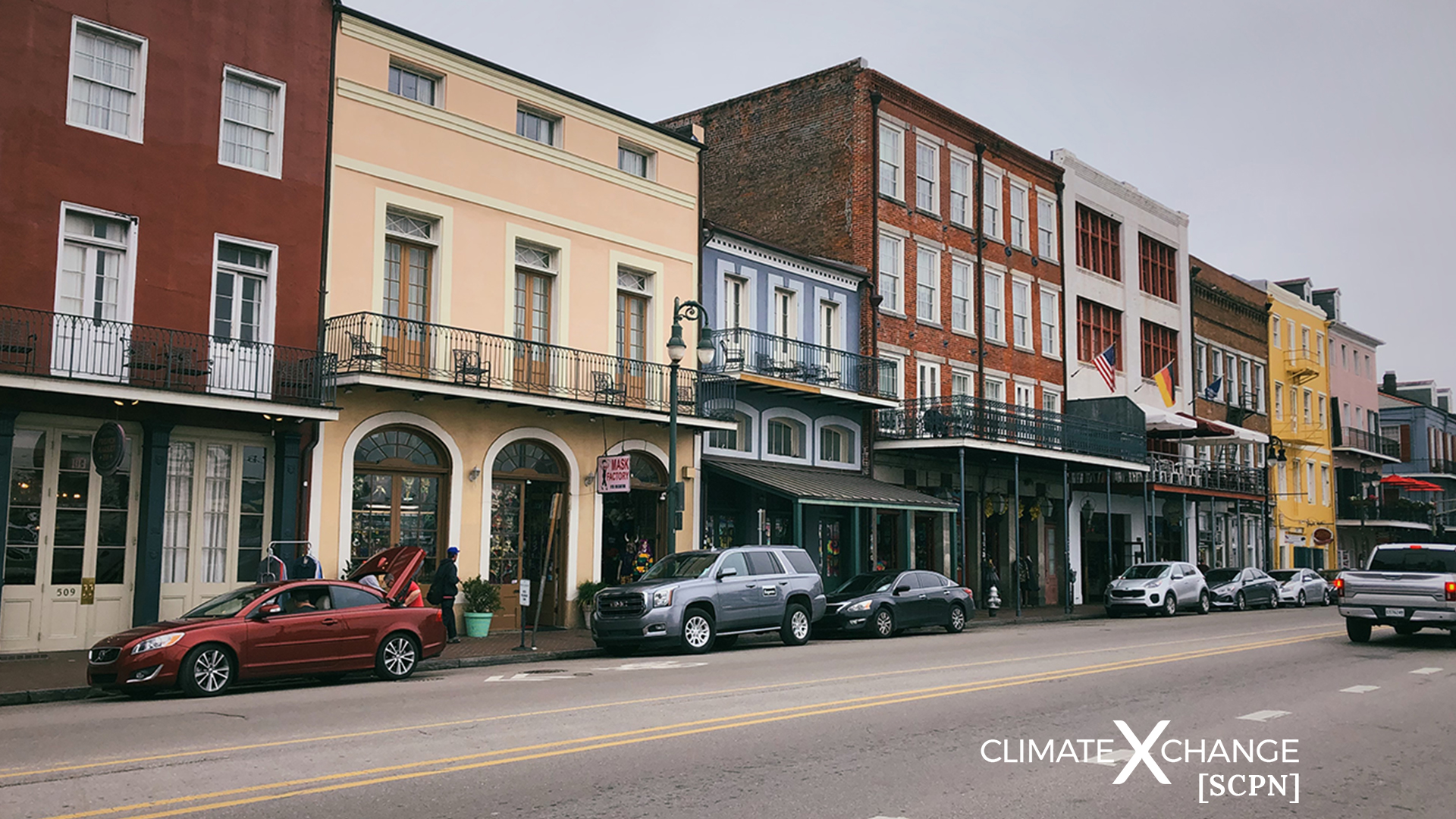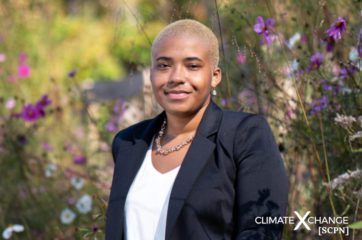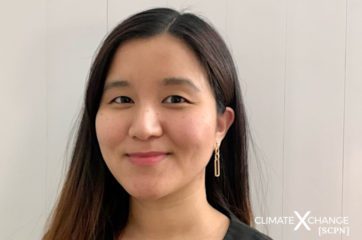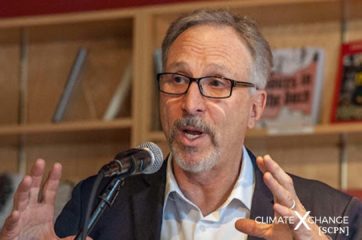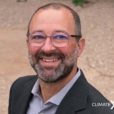All across the country, members of our State Carbon Pricing Network (SCPN) are fighting to make an impact on climate change in their communities. We have individuals in our Network from all 50 states, each experiencing climate change differently in their local areas and finding unique solutions to build resiliency efforts.
This week, we interviewed Jessica Hendricks, who has spent seven years working with environmental justice communities and organizing to address environmental concerns. Currently, she works for the Alliance for Affordable Energy, where she is fighting for energy efficiency programs for homeowners to help reduce utility usage.

Carlie Clarcq (CC): Hey Jessica, thanks so much for chatting with me today. I know a lot has changed since the last time we spoke.

Jessica Hendricks (JH): Yeah, I was thinking back to our last conversation, which was when the pandemic had first hit, and so much has changed since then.

Carlie Clarcq (CC): Absolutely. I’d love it if you could tell us a little bit about yourself to get started.

Jessica Hendricks (JH): My name is Jessica Hendricks, and I live in New Orleans, Louisiana. I’m originally from Baltimore, Maryland, and I moved to Louisiana via California, so I’ve covered all the coasts. Currently, I’m working at the Alliance for Affordable Energy as the State Policy Director. We are a consumer advocate for utility customers, so we help folks that have concerns about being priced out from their utility provider or from their electric service by making sure that our utilities are acting in an environmentally responsible way, and that they aren’t generating excess power that we don’t need.

Carlie Clarcq (CC): That’s great. When you first decided to join the environmental movement, what was it that inspired you to do this kind of work?

Jessica Hendricks (JH): When I first started I worked for the Sierra Club as a community organizer in the San Francisco Bay Chapter, working on community solar, which allows community ownership over a renewable resource, and also invests in clean energy sources. I was working on keeping bills low for folks, and was really inspired by the community-owned model.

Carlie Clarcq (CC): Right, that makes so much sense. It’s a great way to both move to renewable energy, while also empowering homeowners. I’d love to hear a little bit more about how climate change affects you, personally. How have you seen it affect your life and your own community?

Jessica Hendricks (JH): Personally, we have rain events that have been getting worse in New Orleans, and that’s something that everybody here is talking about. Places here are flooding that have never been flooded before. We can talk about the risks of hurricanes—we had a tropical storm this past weekend— but the reality is that even your afternoon rainshower could leave your house flooded. I think that’s a huge issue that we face every day, in terms of what it looks like to live with water.
Then, thinking back to last summer, my own first hurricane experience in New Orleans happened with Hurricane Barry. It was a really early hurricane and the Mississippi River was already very high. We opened up some of the floodgates to drain the river before it got to New Orleans. There was a huge concern that if that hurricane hit the mouth of the Mississippi River, we would all be underwater.
This event shows that climate impacts are really challenging what we thought we knew. We have a levy system around New Orleans that was supposed to protect us from a 100-year storm, but the reality is that storms are changing. The climate is changing in ways that we did not entirely predict or know when we originally built the levy system, and other resilience infrastructure.

Carlie Clarcq (CC): Yeah, that sounds terrifying, to think your whole home could be submerged. I know right now, living during this pandemic, there’s been a lot of ties to the health effects that come from these issues you’re describing, that come from climate change, more broadly. I’m wondering how you see environmental changes tied to public health in the context of this current crisis?

Jessica Hendricks (JH): That’s a really good question. Toxic air quality and pollution— whether that’s just carbon emissions or that’s particulate matter, or heavy metals — are all air pollutants and respiratory irritants. When we’re talking about a respiratory disease that is disproportionately killing communities of color, there’s strong parallels there.
I was shocked when I saw St. James Parish, one of the river parish’s just north of New Orleans on cancer alley, had the highest death rate of COVID-19 in the country. And thinking about that really struck me, because New Orleans was a COVID-19 hotspot, and we had a big explosion of cases very early on. Then there’s St. James Parish, which is half an hour away, has a very small population, and is mostly communities of color that are living in the shadows of these heavy industries and oil refineries who have already been dealing with asthma and other respiratory diseases. They now have ridiculous death numbers compared to the rest of the country.

Carlie Clarcq (CC): It’s so terrible to hear how these communities have been hit so much harder by COVID-19, and it’s so clear to see how those impacts are affecting Americans disproportionately. But hopefully this will inspire people to make real changes to the pollution in these areas, to prevent this from happening again in the future. Now that we’ve discussed some of these effects, I’d love to hear more about your work and what you’ve done to make an impact in these communities, and to reduce some of these awful effects that climate change has in Louisiana.

Jessica Hendricks (JH): In Louisiana, there’s a huge opportunity for energy efficiency. We do not have long term energy efficiency programs for the state, (although we do in the city). Louisiana didn’t have building codes until post-Katrina in 2006. So, there are many of these old Louisiana homes where you can literally see sunlight through the floorboards. There’s no insulation, there’s no flooring, and although they are charming, they are also a huge problem in terms of indoor air quality. Allergens and pests are coming in and air conditioning and heat are going out. It’s not uncommon for folks to have energy bills that are $500 a month in the summer. It’s a lot cheaper, and better for the environment, to insulate all of these homes than to build another power plant to meet the needs of the high-energy using homes.
Energy efficiency is a unique program in the sense that it can also help to alleviate poverty. We call it, “teaching a house to fish.” Instead of just paying people’s energy bills and raising money to do that, why don’t we just seal up those homes to reduce the household bills in the first place? In New Orleans, we have a really high energy burden, so what that means is that the poorest residents are paying upwards of 33% of their monthly income on utility bills. That’s not only unsustainable for that family, but it’s also a huge climate issue. That’s what I’ve been working in Louisiana for — to get these long-term energy efficiency programs through.

Carlie Clarcq (CC): Yeah, it’s awesome that these programs can have the co-benefit of not only improving the environment and reducing climate impacts, but simultaneously helping low-income families pay their bills. Have you seen a lot of progress in this throughout your time working on these policies?

Jessica Hendricks (JH): Yes, I think in New Orleans especially there has been a lot of progress. The City Council oversees and regulates Entergy New Orleans, our utility provider. So in New Orleans, we’ve seen some big savings from these energy efficiency programs.
Louisiana is still working on this as a whole because the utility is regulated differently. Tying it back to the pandemic, this has been something that is really challenging in the policy space, because with all of the uncertainty, unfortunately a lot of the funding for this has been put on hold, as people can’t access the files that they need in their offices and can’t come together for these meetings. Things like that have been very challenging and have caused massive delays with energy efficiency programs.

Carlie Clarcq (CC): Of course. I know everything that isn’t COVID-19 related seems to be moving much slower now. Have you seen the pandemic’s effects on the utility industry change the nature of this work at all as well?

Jessica Hendricks (JH): That goes to a lot of the consumer protection work that I’ve been focused on right now, and this is keeping me very busy, but we’ve made leaps and bounds in the past few months. In the utility sector, a lot of residential bills are now going up, just as commercial bills are going down. We need to make sure that residential customers aren’t on the hook because customers like Walmart aren’t using as much electricity. But we also know that a lot of folks work in bars and restaurants and hotels. All of these people were immediately out of work when the shutdown happened.
We want to make sure that their power is not shut off because they can’t pay their bills without their income, and we also want to make sure that their power is not shut off when we enter Phase Two. We need to make sure that there’s no negative credit reporting on their behalf, and they’re not backed up with late fees. This also brings in questions about the utility model. Is it fair that the utility is guaranteed a profit when no one else is able to make ends meet?
One big win that we had last week in the City Council is suspending the utilities from shutting off through July, and at the Public Service Commission for Louisiana, we’ve got that through the end of June until they make a further decision. So we’re taking these provisions to make sure that residents are able to get back up on their feet.

Carlie Clarcq (CC): That’s so important, and it’s incredible you’ve been able to help do that and mobilize those funds so quickly.

Jessica Hendricks (JH): Thank you, we’re in an interesting phase now with figuring out how to get this out. We want to make sure that people know about these programs and know how to access the funding, because so many people have never been in this position before and have no idea what programs are available. So I’m helping to usher them through a sometimes very arduous processes, and helping them to get the aid that they need.

Carlie Clarcq (CC): Right, I know that’s been so difficult, especially with the amount of reform bills passing that it’s been hard for people to navigate. But thank you for your work on that, it’s so great that you’ve been able to help. I guess a little more generally, I’ll ask what continues to motivate you to do this work? I know it can often be a very slow-moving process.

Jessica Hendricks (JH): Well, I guess I just think it’s the most important thing to do. What else am I going to do? It can be really challenging in Louisiana, because there aren’t a whole lot of wins. But it is those incremental steps, and the ability to move forward towards this shared goal that really keeps me going.
One big win we had recently in Louisiana is the Louisiana Public Service Commission unanimously approved a giant purchase of wind energy for Northern Louisiana. This is historic for Louisiana, and it could be up to 454 megawatts of wind power [a turbine generating two to three megawatts of energy can power 400 homes] for Louisiana.I know that’s not much to some other states, but this is really historic for our state, and it’s exciting that it was a unanimous vote, and that everyone is in favor of adopting renewables in Louisiana. This settlement also included 200 megawatts of solar. So, it’s kind of those steps towards transforming our energy systems that inspire me and keep me going.

Carlie Clarcq (CC): Wow, congratulations, that’s so exciting. Every little increase in renewables is such a big step, and we’ve seen so much movement this year, with renewables beating out coal for more than 40 consecutive days, and I hope to see a lot more of that in the future.

Jessica Hendricks (JH): Definitely. We’ve got to start somewhere, and we’ve got to celebrate the little steps.

